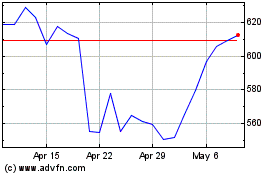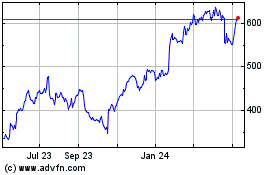Aaron Sorkin's 'Trial of the Chicago 7' Comes to Netflix
15 October 2020 - 10:29AM
Dow Jones News
By Tobias Grey
Among the characters in the new Netflix film, "The Trial of the
Chicago 7," is a U.S. Attorney General who calls for a return to
the homespun manners of his youth. But Aaron Sorkin who wrote and
directed the starry film, which is set during the late 1960s,
insisted that any similarities with the present weren't by design.
"The script didn't change to mirror events," he said. "Events
changed to mirror the script."
"The Trial of the Chicago 7," available on Netflix from Oct. 16,
recounts the real-life events surrounding an anti-Vietnam War
protest that degenerated into clashes between demonstrators and
police leading to one of the most notorious trials of the 20th
century. Mr. Sorkin hewed as closely as he could to the chaotic
events of 1968 by shooting the riot scenes at the same Chicago
locations where they originally happened and intercutting his
narrative with black-and-white documentary footage of the
clashes.
"The Trial of the Chicago 7," which stars Sacha Baron Cohen as
the radical activist Abbie Hoffman and Eddie Redmayne as his more
buttoned-down collaborator and fellow defendant Tom Hayden, joins a
series of projects which are tapping into the current climate of
civil unrest by looking back at historical moments of protest and
advocacy.
These include the Gloria Steinem biopic "The Glorias" which
landed on Amazon Prime last month, Showtime's new series "The Good
Lord Bird" about the fire and brimstone abolitionist John Brown,
the anthology miniseries "Little Axe" about the British Black
experience from the 1960s to the 1980s which premieres Nov. 20 on
Amazon Prime, and "Judas and the Black Messiah," a biopic about the
Black Panther Party chairman Fred Hampton which is due to be
released next year. They follow the well-reviewed miniseries "Mrs.
America," from FX on Hulu, which covered similar ground as "The
Glorias," though from the perspective of conservative activist
Phyllis Schlafly as played by Cate Blanchett.
Most of these projects were shot before Black Lives Matter
protests gripped cities across the U.S., but their historic themes
already felt contemporary for producers. "When CAA came to us with
this script by Aaron Sorkin about racial inequalities, injustices
and protesting the calcified establishments of our government --
how could you not want to be a part of that?" said Cross Creek's
Tyler Thompson about coming on board as a producer of the film.
Mr. Sorkin finished the first draft of his screenplay for
"Trial" back in 2007 after being approached by Steven Spielberg who
was then lining it up to direct. However, the project became almost
immediately sidelined when the Writers Guild of America went on
strike. It remained on hold until 2017 and Mr. Sorkin signed on as
director.
Mr. Baron Cohen reached out to the makers of "Trial of the
Chicago 7" about the role of Abbie Hoffman. Mr. Baron Cohen had
been interested in Hoffman since his college days when his
undergraduate thesis at Cambridge University was about radical Jews
in the civil-rights movement. The British actor wore a curly wig
and adopted a Boston accent (with a hint of Brooklyn) for the role,
capturing what Mr. Sorkin described as the movie's "Elvis character
where you have to pay attention to physical and vocal
qualities."
As Mr. Sorkin completed his movie, "suddenly protesters were
being met with tear gas, riot clubs and federal troops," he said.
"Watching the footage every night of protesters clashing with the
police it looked exactly like 1968 all over again."
Some off-the-cuff remarks Donald Trump made about a protester on
the eve of the Nevada caucus in early 2016 also spoke to Mr.
Sorkin's movie in a way that he could never have predicted, he
says. "Trump started waxing nostalgic about the 'old days' when
they would have taken that guy out of there on a stretcher after
beating the crap out of him," Mr. Sorkin says. In "Trial" there is
a true-to-life scene where the Black Panther Bobby Seale (Yahya
Abdul-Mateen II) is shackled and gagged in the courtroom at the
behest of judge Julius Hoffman (Frank Langella).
"The Glorias," which stars Alicia Vikander and Julianne Moore as
younger and older incarnations of Gloria Steinem, was also a
project that its director and co-screenwriter Julie Taymor began
developing before Mr. Trump was elected president, when she had
thought the country would have its first female president.
"Obviously that didn't happen," she says. "So the movie became even
more critical and more important to get out and to show all of the
things that we're still struggling with today."
In "The Glorias," Ms. Taymor says she was especially determined
to highlight the role African-American women, such as Dorothy
Pitman Hughes (Janelle Monáe) and Florynce Kennedy (Lorraine
Toussaint), played in leading the second wave of feminism that
emerged in the 1960s.
"There really is no equivalent to individuals like Hayden and
Hoffman today because social media does that job now," Mr. Sorkin
says. " Twitter just says get on the streets and everybody does it
so it's not as well-organized as it was. Of course I understand the
irony that I'm talking about a protest being well-organized that
ended in catastrophe, but right up until the final moment it was
well-organized."
(END) Dow Jones Newswires
October 14, 2020 19:14 ET (23:14 GMT)
Copyright (c) 2020 Dow Jones & Company, Inc.
Netflix (NASDAQ:NFLX)
Historical Stock Chart
From Mar 2024 to Apr 2024

Netflix (NASDAQ:NFLX)
Historical Stock Chart
From Apr 2023 to Apr 2024
